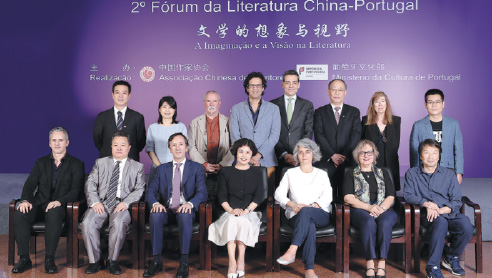Beyond going global
By Mei Jia | China Daily | Updated: 2019-06-14 09:09

Chinese writers Liu Zhenyun, Xu Zechen and Lu Min were among those who spoke about the influence of the late Portuguese literary great Jose Saramago and poet Fernando Pessoa at the forum, where contemporary Portuguese writer Isabela Figueiredo was also present.
In his talk, Qiu Huadong highlighted the literary schools in China that came out as a result of the reform and opening-up, and said the two rising genres now are science-fiction and web novels.
Maria Carlos Loureiro, director of the book section of the Portuguese General Directorate for Book, Archives and Libraries, says Portugal has sponsored translation and promotion of its literary works, illustrations and other books for 25 years. Since 1993, a total of 3.5 million euros ($3.96 million) has been used to turn 2,100 Portuguese titles into 49 languages for 77 book markets.
In China, the approach is similar. Launched respectively, in 2006 and 2009, by the State Council Information Office, the China Book International project and China Masterwork International seek to "present a true, multidimensional and panoramic view" of the country abroad through books.
During a meeting of the projects' member groups in Harbin, Heilongjiang province, in May, crime/suspense novel Death Notice was praised by Zhang Yanbin, together with themed publications of President Xi Jinping, books on the Belt and Road Initiative, as well as Cao Wenxuan's award-winning children's tales as "name-brand Chinese publications" in recent years.
Zhang, an official of the Publicity Department of the Central Committee of the Communist Party of China, says compared with a decade earlier, the progress made in promoting Chinese books abroad is huge today. "Things are at a turning point."
According to Hao Yun, president of Beijing Language and Culture University Press, since he joined the China Book International meetings in 2011, publishers' topics have shifted from single-copyright trade and setting up branches overseas to in-depth plans to do the job better.
"We're stepping into a new era promoting Chinese books abroad," Hao Yun says, adding the press' channels have been widened to help other publishers take their titles to target markets.
Xin Guangwei, chief editor of People's Publishing House, says timing and marketing are crucial to publishing in foreign lands, too.
When selling Tu Youyou's biography in Morocco, Xin and his team compared Tu, the first Chinese national to be awarded the Nobel Prize in Physiology or Medicine, in 2015, to Marie Curie, and borrowed influence and recognition from local celebrities.
By the end of 2018, China Book International has signed 3,128 agreements with 702 publishers from 82 countries and regions to sponsor the fees for translation and marketing for some 3,567 titles in 57 languages. And China Masterwork International had signed 105 agreements with 63 publishers in 25 countries for the translation of some 1,089 titles in 16 languages.
Zhang Zehui, also an official from the same department, says in 2018, China bought 18,000 copyrights from overseas and sold out 14,000, with the ratio being 1.28 to 1. While 10 years ago, it was 6.9 to 1.
As Liu Cixin told CCTV: "Our literature and culture have to reflect our thoughts on shared civilizations, longings, pursuits and emotions of humankind, to finally reach out to the world."
























